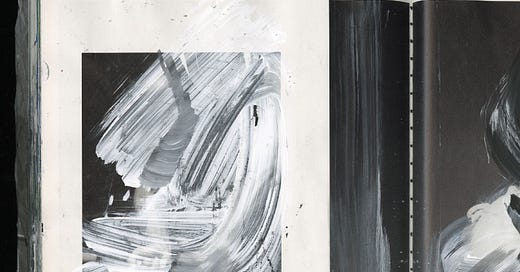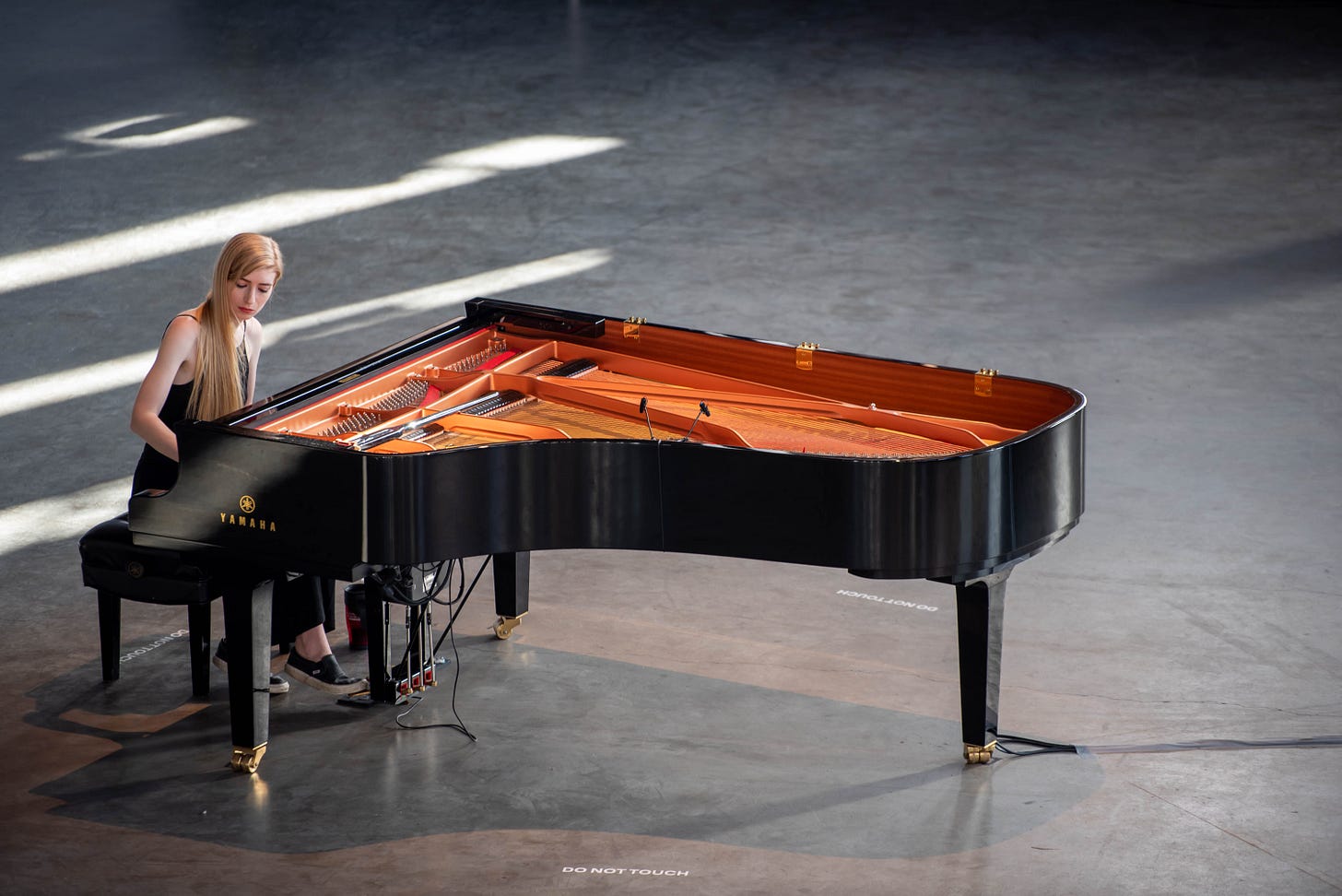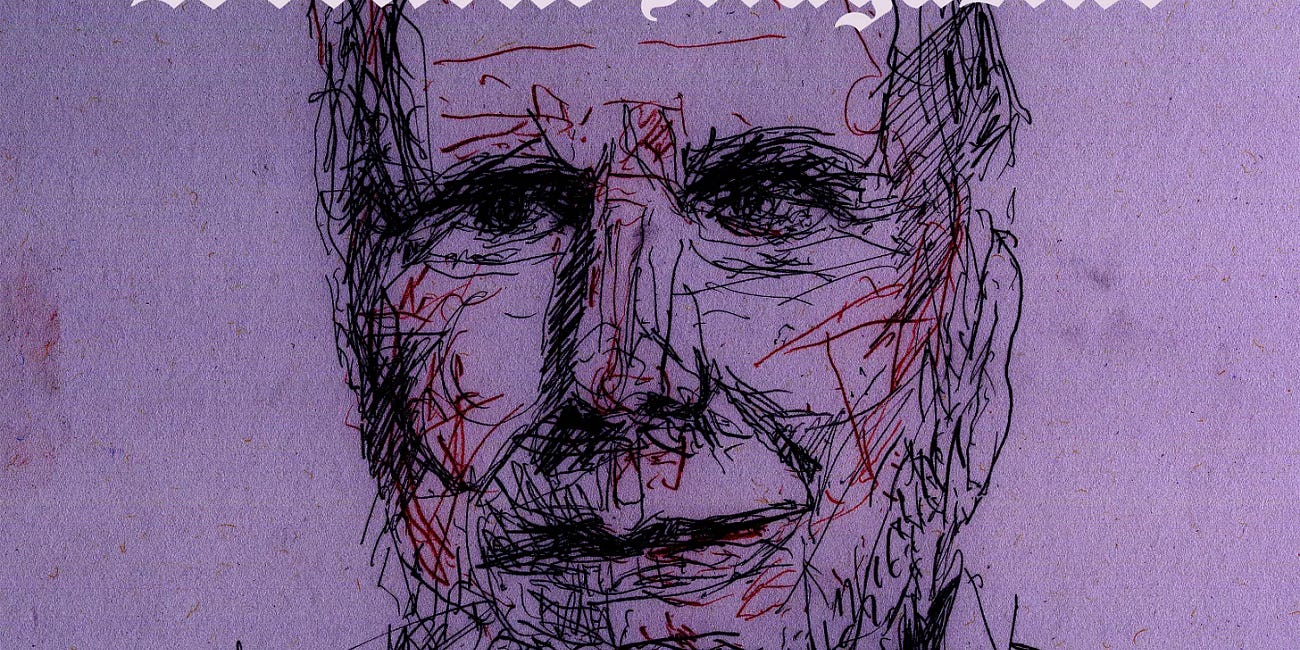Herb Sundays 122: Kelly Moran
The acclaimed pianist shares a stunning live review of memorable artists. + SV4 on AI, ENO, and "hit em."
Herb Sundays 122: Kelly Moran (Apple Music, Spotify).
Art by Michael Cina. Photo by Edwina Hay, courtesy of Pioneer Works
“I designed this mix around artists whose live performances have blown me away in the last few years. As a pianist, I'm usually playing on the earlier end of the night at festivals, which gives me the luxury of watching all the artists who perform afterwards. It's my favorite way to discover new music and experience music I might not have heard otherwise. This Sunday Mix is an eclectic sampling of artists I've seen live who made a deep impression on me in my travels.” - Kelly Moran
From the bio: Over the past decade, New York-based composer and producer Kelly Moran has challenged the piano's traditional, classically-imposed school of thought with a more contemporary, experimental approach. An accomplished and highly sought-after composer, Moran has collaborated with artists the likes of Oneohtrix Point Never as part of his touring ensemble for 2018 album Age Of, as well as singer and composer FKA Twigs' live ensemble. Moran has also composed for classical musician Margaret Leng Tan and worked with other visionary contemporaries like Kelsey Lu and Yves Tumor. As a solo artist, Moran's critically acclaimed albums, Bloodroot and Ultraviolet, have explored a variety of extended piano techniques like John Cage-inspired prepared piano and exercises in improvisation. Her unique strand of experimental piano compositions, which conjure hypnotizing textures and dramatic compositional arcs, have been included on year-end lists across classical, avant-garde, and metal genres.
When I sat down to write, I had forgotten Moran was also a Michigan graduate. I have been fawning over this mix, both as a travelogue and as a wonderful connection between genres. Her new album is fantastic and has a great story to boot.
, who has covered Moran more than once, says, “Moran’s music is straightforwardly beautiful, and if you listen actively, you hear the magic alloy of precise composition and random acoustics.”Moran has a keen sense of visuals and narrative, which imbues each of her projects with taste. The art direction and video for Moves feature figure skater Elizabeth Yoshiko Schmidt. There’s a nice metaphor in there, the idea of endless private practice in the aid of public performance. The album bio states: “Referring to a series of skating rudiments, the title Moves in the Field reflects the intense practice Moran put into becoming an even more masterful pianist when paired with an impossibly perfect technical partner: the Disklavier.”
Indeed, Moves is a series of duets for Moran and her Yamaha Disklavier (“a technologically advanced version of a player piano which can replicate human-like playing through intense fine-tuning and programmable dynamics”), which acts as subservient NPC, a pace car to both aid and embellish Moran’s technical abilities while leaving her to ring out an emotional expression alongside it by virtue of it being able to write intricate piano parts that go beyond human capabilities (“inhumanly fast arpeggios, chords requiring more than ten fingers to play, and other motifs surpassing physical limits on the piano”).
Moran is signed to both Warp and Yamaha, and her album was recorded by Dan Bora (Philip Glass' sound engineer) and mastered by Josh Eustis (aka Telefon Tel Aviv), both examples of movement between her taste worlds. All of these couplings are probably a first, but then again, Warp’s most beloved composer, Aphex Twin, has long been seen as a classical music outgrowth. Moran has covered “Avril 14" of course.
While the Disklavier theme was pandemic-aided, it also falls into a more timely narrative: that of AI and how we need artists to push and test these tools, not just be replicated by them, as most existential conversations about AI tend to follow.
As she shared via an interview with
:“But prior to COVID hitting, Yamaha loaned me a Disklavier. I was writing a duet for myself and Missy Mazzoli and I asked them—I’m such a brat (laughter)—for this piano because I thought it’d be great to hear these two pianos in real time. So they loaned me this Disklavier for a month, and then the pandemic hit and they were like, “Just hold onto that, we’re not gonna need it anytime soon.”
For the Moves Pitchfork review, Vanessa Ague said : The results are more complex than she could have played on her own. The Disklavier allowed her to create layers and patterns that exceed the physical limitations of the most talented human pianist. But despite these complex techniques, Moran’s music feels anything but demanding. Instead, she lets warmth ring out, finding sweetness within the rapid-fire arpeggios facilitated by the instrument.
A not dissimilar thread runs through the work of longtime Ghostly friend and collaborator, Sougwen Chung who has AI including tangible robots to assist and augment her work for many years. Chung has become a great example (including a TIME magazine nod) of a possible path for artists seeking to be enhanced by the machine, not pushed back.
In the fields I move in with musicians and designers, this is becoming more and more tricky. While we know that these tools will (and already has) taken space from artists, it also makes us question what we seek from art and artists. Many of us seek art to be connected to a greater whole, not merely for the output, which can increasingly feel more stats-driven. For example, for my DJ friends, “mixing” is no longer a pre-req. You could argue this is a problem, but then you’d have to say the same thing about sampling or electronic instruments to follow.
When talking to someone like
who I interviewed for Herb last year, he will express similar concepts. “Well, yeah, it's definitely a new art form, and a new medium. And the key framing of it is that it's a partnership with the with the AI and there will be many AIs with different artistic abilities and talents and propensities. So there'll be functions where you can have like a “first pass,” done by the AI that’s like, “okay, these are kind of good I think, I think this is a good suggestion.” I can certainly see that there'll be an AI editing assistant that will take all the things in balance and would learn over time, and you could reward points for getting it close. But it'll be a partner.”The Herb Sundays Sunday Magazine: An interview with Kevin Kelly
The Herb Sundays Weekend Magazine: Kevin Kelly.
Moran and Chung give us models where artists can tap into their own instincts and curiosity about what machines think of us in order to aid our abilities and give us the opportunity to expand those talents to enhance a new kind of authorship. I was able to see the Brian Eno documentary last week by the great
and its a reminder that post-modernity, ideas in themselves are the thing. For Eno, the man, and the movie, the “parameters” of an art practice become the human part. The film itself is a non-linear generative arc, where no two screenings are the same, and I think a new expression that works extremely well given the subject matter. It’s a staggering achievement I hope to see again.Speaking of generative, the most fun in my filter bubble this week has been the “hit em" tweets, literally the brainchild of Dr. Drew Daniel, the artist who works as part of Matmos and alone as The Soft Pink Truth, who had a dream where someone told him about a genre in specific terms and posted about it. Luckily thanks to the potentially crumbling yet still playful community of Twitter, artists have started making songs to fill in the blanks of the genre. It’s even made it as far as The Guardian. It's maybe the first example of “genre as prompt” that I’ve seen, a new variant of AI that is artist-led. Instead of genre as historical phrasing or even accident, this mode gives a chance for new producers to be heard, who may previously not have been given a platform. I can’t wait to see what unfolds.
Daniel spoke to
and wrote about the phenomenon in if you want to dive deeper.








re hit em — comparing this to a prompt is a brilliant throughline. define the tempo, define the meter, define “vibe”, here’s a piece of music that fits. it’s been so cool to watch this unfold from a “haha crazy dream🤪” —> people trying to interpret this dream logic and bring some shape to the surreal…
but i cant help but push back on classifying this collaboration as any type of ai… what’s less artificial, more human, less intelligent, more indecipherable than dreams?
we talk a lot about genre as being communities — communities of practice, of audience, and of artists (see a lot of glenn mcdonald’s writing on the subject) and The Internet ^tm has obviously connected people and allowed for many types of mostly-online genres and scenes to proliferate… but i dont know if im familiar with another time that genre generation has been quite so explicit, so on-demand: “this is what im looking for, it is called xyz, deliver it to me.” beyond the meme factor of it all, someone is going to start dropping some 5/4 shits in their set, and the heads will hear it and know and thus the vibes will propagate. i can feel it…
Kelly's albums are absolutely incredible works !